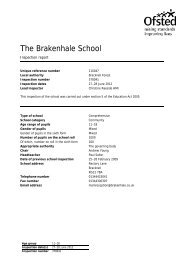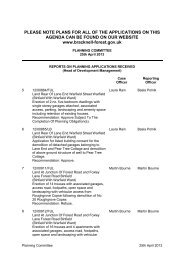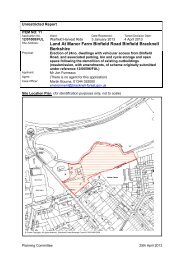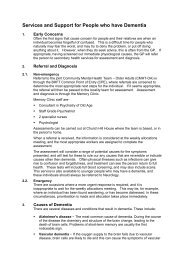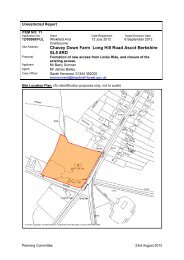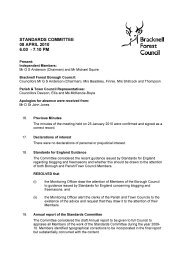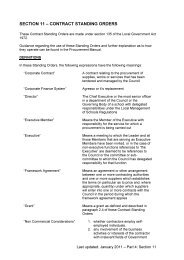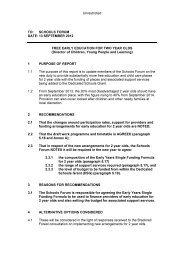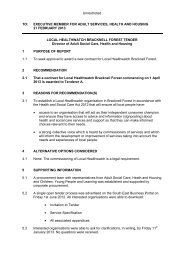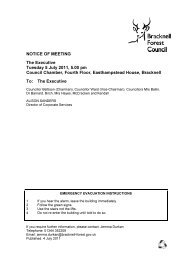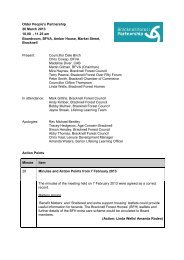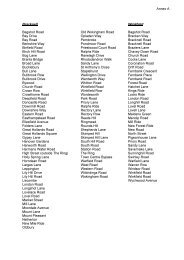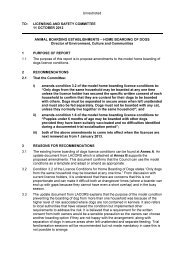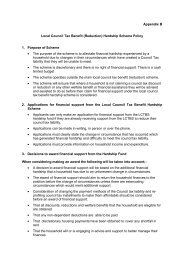Appendix C Wildmoor Heath , item 3. PDF 86 KB
Appendix C Wildmoor Heath , item 3. PDF 86 KB
Appendix C Wildmoor Heath , item 3. PDF 86 KB
You also want an ePaper? Increase the reach of your titles
YUMPU automatically turns print PDFs into web optimized ePapers that Google loves.
Tribal<br />
1–4 Portland Square<br />
Bristol<br />
BS2 8RR<br />
T 0300 123 1231<br />
Text Phone: 0161 6188524<br />
enquiries@ofsted.gov.uk<br />
www.ofsted.gov.uk<br />
Direct T 0117 311 5319<br />
Direct F 0117 315 0430<br />
Direct email: matthew.parker@<br />
tribalgroup.com<br />
7 March 2013<br />
Mr Grant Strudley<br />
Headteacher<br />
<strong>Wildmoor</strong> <strong>Heath</strong> School<br />
Lower Broadmoor Road<br />
Crowthorne<br />
Berkshire<br />
RG45 7HD<br />
Dear Mr Strudley<br />
Special measures: monitoring inspection of <strong>Wildmoor</strong> <strong>Heath</strong> School<br />
Following my visit to your school on Tuesday 5 to Wednesday 6 March 2013, I write<br />
on behalf of Her Majesty’s Chief Inspector of Education, Children’s Services and Skills<br />
to confirm the inspection findings.<br />
The inspection was the third monitoring inspection since the school became subject<br />
to special measures following the inspection which took place in December 2011.<br />
The full list of the areas for improvement which were identified during that<br />
inspection is set out in the annex to this letter. The monitoring inspection report is<br />
attached and the main judgements are set out below.<br />
Progress since being subject to special measures – good<br />
Progress since previous monitoring inspection – good<br />
Newly qualified teachers may not be appointed.<br />
This letter and monitoring inspection report will be posted on the Ofsted website. I<br />
am copying this letter and the monitoring inspection report to the Secretary of State,<br />
the Chair of the Governing Body and the Director of Children’s Services for Bracknell<br />
Forest.<br />
Yours sincerely<br />
Kekshan Salaria<br />
Her Majesty’s Inspector
Annex<br />
The areas for improvement identified during the inspection which took<br />
place in December 2011<br />
Raise attainment, particularly in mathematics, and accelerate the progress that<br />
pupils make, especially boys and the more able, so they achieve well by:<br />
– ensuring every teacher has consistently high expectations of all pupils<br />
– providing a well-balanced curriculum which excites pupils and builds their<br />
skills and knowledge progressively in all subjects, especially mathematics<br />
– ensuring teachers’ assessments are accurate and reliably identify pupils who<br />
need additional support<br />
– tracking pupils’ progress year on year to provide a clear picture of their<br />
achievement as they move through the school<br />
– using the information robustly to secure consistently high-quality provision in<br />
all year groups and subjects.<br />
Improve the quality of teaching and learning so that they are consistently good<br />
or better by:<br />
– developing teachers’ understanding of what the very best teaching and<br />
learning are like<br />
– providing pupils with varied, challenging activities in lessons that are<br />
interesting and carefully matched to their different abilities<br />
– maintaining a brisk pace by assessing how well pupils are learning throughout<br />
a lesson and moving them on to the next steps more quickly, particularly<br />
more-able pupils<br />
– providing opportunities for pupils to develop and explain their ideas<br />
– implementing a whole-school approach to marking which identifies clearly<br />
what pupils have done well and how they can improve further.<br />
Increase the capacity for sustained improvement and strengthen leadership at all<br />
levels by:<br />
– ensuring all staff understand their roles and responsibilities and have the<br />
skills, knowledge and support to fulfil them effectively<br />
– addressing any underperformance swiftly and holding all staff to account<br />
robustly for the impact of their work<br />
– developing the monitoring and evaluation of the school’s work by the<br />
governing body so that it is able to provide sufficient challenge and support to<br />
school leaders<br />
– ensuring plans for improvement include quantifiable targets, specific<br />
measures of success and milestone points at which to evaluate progress.
Special measures: monitoring of <strong>Wildmoor</strong> <strong>Heath</strong> School<br />
Report from the third monitoring inspection on 5−6 March 2013<br />
Evidence<br />
Her Majesty’s inspector observed the school’s work, scrutinised documents and met<br />
with the headteacher, other senior and middle leaders, the Chair of the Governing<br />
Body and four governors, pupils and a representative from the local authority.<br />
Context<br />
A new substantive headteacher started work at the school in January 201<strong>3.</strong> The<br />
deputy headteacher is currently absent from the school on sick leave. Two part-time<br />
and two full-time teachers left the school. Two long-term supply teachers have been<br />
recruited to work at the school.<br />
Achievement of pupils at the school<br />
Children in the Nursery and Reception classes are developing their language and<br />
independent skills well because of the positive interactions with adults, who ask<br />
sensitive questions to promote talk. Children have many opportunities to choose<br />
activities or extend their own learning through purposeful play.<br />
Pupils’ progress has accelerated in the majority of classes because learning in<br />
lessons is now consistently at least satisfactory and often better. Mathematics<br />
lessons are put into an everyday context and are increasingly purposeful so that<br />
pupils understand its relevance to them. Additionally, open-ended tasks and<br />
investigations are used to develop the broader mathematics skills of problemsolving<br />
and reasoning. The school’s most recent assessments suggest pupils are<br />
making good progress towards meeting the school’s spring term targets in reading<br />
and mathematics and a much better profile in writing. Senior leaders correctly<br />
continue to have the development of writing as a key priority in the school’s Raising<br />
Attainment plan.<br />
Pupils are keen learners whose positive attitudes make a good contribution to their<br />
progress; they enjoy a challenge. For example, in a mathematics lesson, Year 4<br />
pupils put maximum effort into working out the perimeter and area needed for<br />
developing their playground. Across the school, pupils collaborate well with one<br />
another, listening attentively to their teachers and classmates. They follow<br />
instructions promptly and apply themselves diligently to the tasks in hand, showing<br />
good social and moral development. The consistently good standard of<br />
presentation, particularly in Key Stage 2 pupils’ books, shows the pride pupils take<br />
in their work.
Progress since the last monitoring inspection on the areas for improvement:<br />
<br />
Raise attainment, particularly in mathematics, and accelerate the progress<br />
that pupils make, especially boys and the more able, so they achieve well<br />
– good<br />
The quality of teaching<br />
The intensive focus on accurately assessing pupils’ learning is making a difference.<br />
This is because lesson plans are now better matched to the needs of individuals and<br />
groups. Teachers include a variety of interesting activities and model these clearly<br />
for pupils. In the best lessons, classes are managed well and the pace is swift.<br />
Learning is well graduated and levels of challenge are high. For example, in lessons<br />
observed in Years 3 and 5, good relationships and clear demonstration by the<br />
teachers of what the pupils should do encouraged high levels of participation and<br />
enjoyment in fast-paced learning. Where teaching is less effective, assessment<br />
during lessons does not always identify gaps in pupils’ understanding so the pace of<br />
learning slows and opportunities to develop pupils’ speaking and listening skills are<br />
sometimes missed when pupils are not given enough time to formulate their<br />
responses, for instance, when discussing a question with their talk partner. The less<br />
able pupils are sometimes given work that is too hard and they struggle to complete<br />
it even with help.<br />
Pupils’ workbooks show that teachers’ marking is improving as a result of recent<br />
action by senior leaders; marking is completed regularly and frequently indicates to<br />
pupils the next steps in their learning.<br />
Progress since the last monitoring inspection on the areas for improvement:<br />
<br />
Improve the quality of teaching and learning so that they are consistently<br />
good or better – good<br />
Behaviour and safety of pupils<br />
Pupils move around the school in an orderly fashion and conduct themselves<br />
sensibly in the playground and in the dining hall. They engage well with visitors and<br />
are confident in making their views known. Pupils are proud of their school and loyal<br />
in their support for the school to improve further.<br />
The quality of leadership in and management of the school<br />
The headteacher, although very new to the role, has gained the confidence of the<br />
staff, pupils and support from parents and carers in a short period of time.<br />
Determined leadership plus a willingness to acknowledge weaknesses and accept
support have enabled the school to make good progress since the previous section 5<br />
inspection. Staff morale is high, and there is a common sense of purpose.<br />
Teachers’ expectations of what pupils can achieve are rising because of improved<br />
subject knowledge and sharing of best practice. Middle leaders are enthusiastic<br />
about their role and are beginning to play a stronger part in driving improvement<br />
and consistency but their monitoring and evaluation skills are not yet fully<br />
developed.<br />
A whole-school focus on writing has led to a systematic approach to teaching writing<br />
skills. Consequently, pupils are beginning to write for sustained periods and for a<br />
variety of purposes. Developments to the curriculum mean pupils have increased<br />
opportunity to use their writing skills across different subjects. However, senior<br />
leaders are aware that the quality of pupils’ writing in these subjects is not always as<br />
strong as it is in their writing books. There are also more opportunities for pupils to<br />
develop their speaking and listening skills in literacy lessons and across the<br />
curriculum. Further improvements to the school’s systems for tracking and<br />
monitoring pupils’ progress mean senior leaders have a much better understanding<br />
of how each pupil is achieving. The continued implementation of regular meetings<br />
between teachers and senior leaders to discuss each pupil’s performance has led to<br />
greater whole-school accountability for the progress of all pupils. The school is<br />
developing suitable plans to monitor and evaluate the effectiveness of teaching<br />
assistants.<br />
The governing body organises its work more effectively to ensure that the school’s<br />
leaders are held to account through regular and close checking on the school’s<br />
progress. They are knowledgeable about the school’s strengths and areas of<br />
development and have high ambitions for the improvement of the school.<br />
Progress since the last monitoring inspection on the areas for improvement:<br />
<br />
Increase the capacity for sustained improvement and strengthen<br />
leadership at all levels – good<br />
External support<br />
The external support provided to the school has been effective and well targeted.<br />
The local authority continues to provide good support to the school through, for<br />
example, the support of consultants and advisors and training and support for<br />
members of the governing body. The local authority has regularly carried out<br />
monitoring visits and met with school leaders and members of the governing body to<br />
rigorously evaluate the school’s progress.



